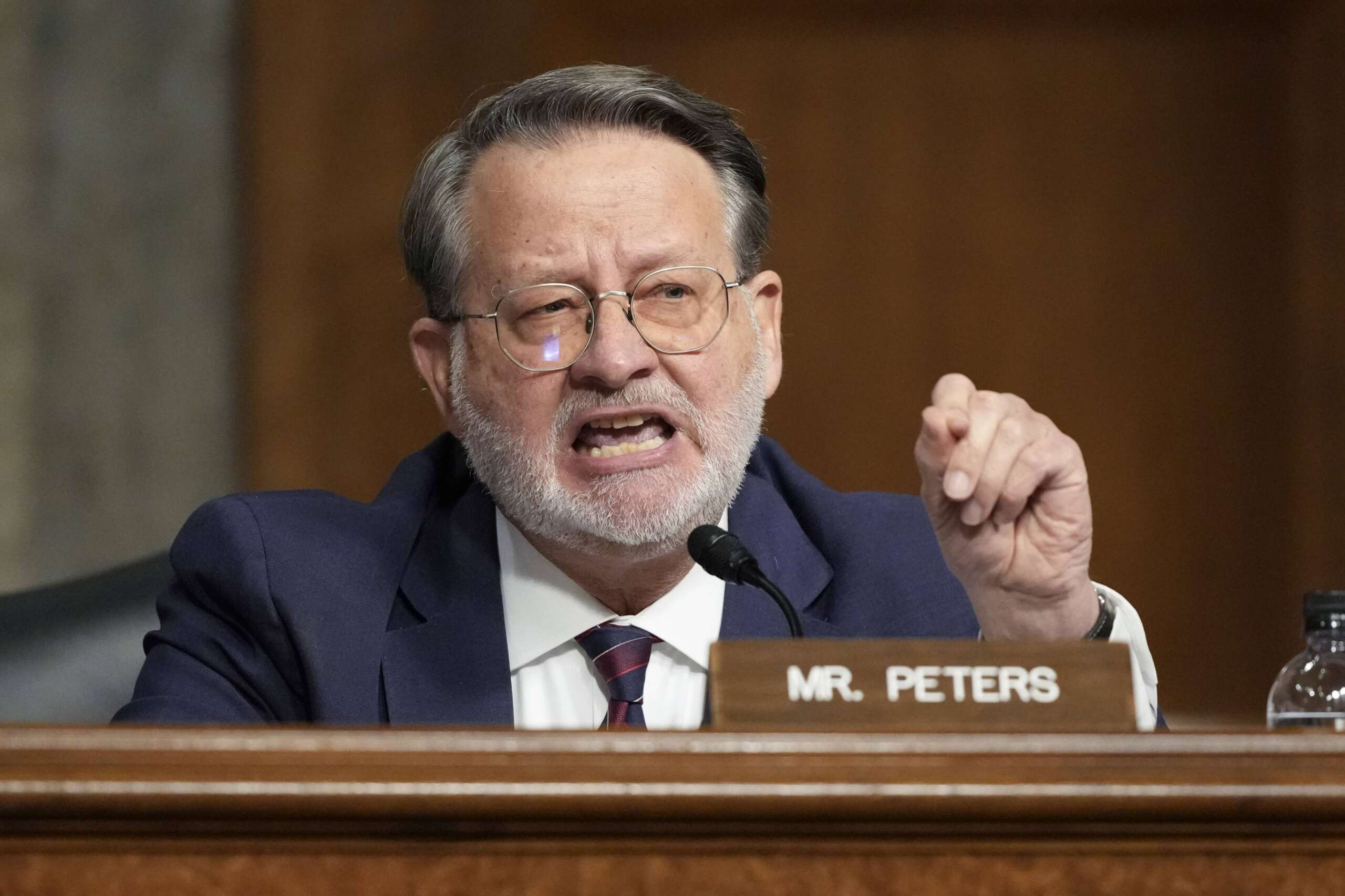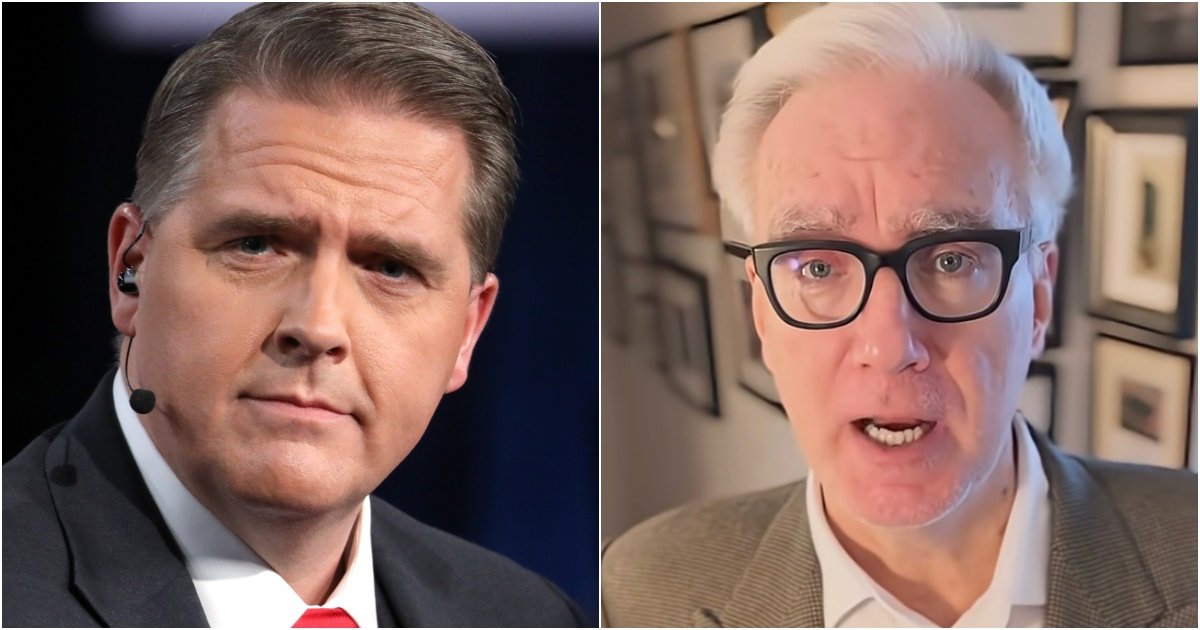Politics
Sen. Peters believes the time is right for SAMOSA

A bipartisan group of Senators are trying to get ahead of the legislative clock and push through a software management bill that potentially could lead to billions of dollars in savings across the government.
Sen. Gary Peters (D-Mich.), ranking member of the Homeland Security and Governmental Affairs Committee, will reintroduce the Strengthening Agency Management and Oversight of Software Assets (SAMOSA) Act today — Federal News Network has learned. Peters is the lead sponsor along with fellow HSGAC members Sens. Joni Ernst (R-Iowa), and James Lankford (R-Okla.), as well as Sens. Bill Cassidy (R-La.), Ron Wyden (D-Ore.) and Thom Tillis (R-N.C.).
Sen. Gary Peters (D-Mich.) is reintroducing the Strengthening Agency Management and Oversight of Software Assets (SAMOSA) Act. (AP Photo/Ben Curtis, File)
The Senate ran out of time to act on SAMSOA last session, after the House passed it in December. But Peters, who is retiring from the Senate at the end of his current term in 2026, is seeking to get started earlier on this bill as part of his effort to further cement his legacy as a lawmaker that championed federal IT reforms and cost savings.
“By improving how the federal government tracks and manages software purchases, this bipartisan bill will help save taxpayer dollars, strengthen cybersecurity, and promote innovative government operations,” Peters said. “This commonsense approach ensures agencies can make needed upgrades to better serve the American people while reducing wasteful spending.”
The latest version of SAMOSA mirrors the Senate bill the committee passed in May 2023. It also is similar to the House version introduced in March by Reps. Nancy Mace (R-S.C.), the late Gerry Connolly (D-Va.), and several other lawmakers.
“The issues SAMOSA addresses are still a challenge. The text of the bill hasn’t changed from what passed the committee in 2023, but even two years later, the Government Accountability Office continues to find reasons why Sen. Peters wrote the bill in the first place and agencies need to address them,” said a HSGAC aide. “SAMOSA puts into place a repeatable process that goes beyond wielding a chainsaw at the immediate moment. The process has to be in place from CIO to CIO and from administration to administration and that becomes the way agencies do business to understand what software they bought and why.”
Bigger savings opportunity than MEGABYTE Act
A second aide to HSGAC said Peters believes SAOMSA could help save agencies an estimated $750 million a year in how they manage and procure software.
The aide added SAMOSA, which is a follow up to and builds on the Making Electronic Government (MEGABYTE) Act, is asking agencies to capture costs that have never been calculated, particularly around the underlying infrastructure needed to support the software they are acquiring. GAO estimated agencies saved more than $3 billion since 2019 under the MEGABYTE Act.
“We just don’t know how much more agencies save because this data never been obtained,” the aide said.
The aide said GAO’s recent testimony on software licensing at the Veterans Affairs Department is a good example of the continued challenges and where SAMOSA would help.
GAO found, “VA was not tracking the appropriate number of licenses for each item of software currently in use. Additionally, the department did not compare inventories of software licenses that were currently in use to purchase records on a regular basis.”
SAMOSA would require agencies to take several steps to address these and other ongoing problems GAO has highlighted over the years.
The agency chief information officer, CFO, chief acquisition officer and chief data officer must work together to develop a software inventory that includes a comprehensive assessment of the software paid for by or deployed throughout the agency through contracts or other agreements as well as those developed by the agency.
The inventory also should include information on any additional fees or costs, including those for using cloud services, that are not included in the initial costs of the contract. The costs and fees include those associated with future software updates.
Additionally, the analysis should list of any provisions in the software that may restrict how the agency can deploy or use the software, including any restrictions on desktop or server hardware, through a cloud service provider, or on data ownership or access.
Agencies would have more control
The legislation then calls on agency leaders to use the inventory to consolidate software titles and licenses, cut any unnecessary costs and restrict bureaus or offices from buying new software licenses without the approval of the agency’s CIO.
“The dynamic SAMOSA is trying to correct is the vendors sales machine vs. agency buyers. Industry has more resources, sales people and marketing dollars than any single cadre of agency contracting officers, and the incentives for sales people to sell is too great,” said a former administration official who worked on software management issues. “Agencies are unable to get information, data and visibility across everything they own to make rational decisions to reduce cost and drive performance to meet and sustain the mission. If the work of SAMOSA is done properly and thoroughly, that dynamic will shift in the agency’s favor to make smarter buying decisions now and in the long run.”
A former administration official said there may be no better time for SAMOSA to get over the finish line.
“There is a much greater focus across many more parts of the executive branch on this issue. There are very few issues that can get bi-partisan support across Congress and administration and this is right in the middle of that,” the former official said. “What DOGE has done around software licenses is checkers, but what SAMOSA wants to do is chess. It will establish a far more long lasting process of reconciliation, management and oversight of software.”
The U.S. DOGE Service has been focusing on reducing the number of software licenses across government over the last five months.
On May 30, DOGE posted on “X” that, “Agencies often have more software licenses than employees, and the licenses are often idle (i.e. paid for, but not installed on any computer). These audits have been continuously run since first posted in February.”
DOGE said most recently, the IRS had 3,000 Visio licenses and were only using only 25. It says the agency cut the remaining 99%.
The Labor Department cut 68% of unused “project planning” software licenses
The Securities and Exchange Commission was only using 22% of their remote desktop software and cut the remaining 78%.
“These 3 changes alone, a small portion of the total, saved more than $5 million a year,” DOGE said on “X.”
Additionally, the General Services Administration has been pursuing enterprisewide software licenses. It has agreed to four so far with Microsoft, Google, Adobe and Salesforce.
One of several bills in the works
The HSGAC aide said Peters and other sponsors feel good about SAMOSA passing this year, whether as a stand alone bill or as part of another piece of legislation like the Defense authorization bill.
“This is a priority for Sen. Peters. The key is for the chairman [Sen. Rand Paul] to schedule a markup. We have a markup that was postponed that still has to happen. We hope for the next one this bill will be in contention,” the aide said. “The bill passed unanimously last time and we hope for similar outcomes this time.”
The former administration official also is confident that SAMOSA will pass, especially given the focus by
the Trump administration on improving software procurement and finding savings.
The aide added Peters also is looking to sponsor or co-sponsor several other technology related bills in the coming months.
Peters and Lankford introduced the Streamlining Federal Cybersecurity Regulations Act last week to address overlapping and contradictory compliance requirements that the lawmakers say hinder effective cybersecurity efforts and create unnecessary burdens for critical infrastructure owners and operators.
Additionally, Peters co-sponsored the MGT Reform Act last year and expects to be part of the Senate’s version this year. Mace introduced the House bill in April.
Peters also is expected to introduce the Transparent Automated Governance Act (TAG Act) again in the coming weeks. This bill would require agencies to provide more transparency around the use of artificial intelligence. He also is looking to bring the Prepared for AI Act, a related measure.
The post Sen. Peters believes the time is right for SAMOSA first appeared on Federal News Network.
Politics
Black Lives Matter Activist in Boston Pleads Guilty to Federal Fraud Charges – Scammed Donors to Fund Her Lifestyle

Screencap of YouTube video.
A Black Lives Matter activist in Boston named Monica Cannon-Grant pleaded guilty to federal charges this week, admitting that she scammed donors and used their money to fund her own lavish lifestyle.
Cannon-Grant was previously held up as an admired figure. The city of Boston named her the Bostonian of the year at one point for her ‘social justice activism’ and she was even recognized by the Boston Celtics basketball team for her efforts.
She is now facing a minimum of two years in prison.
The New York Post reports:
BLM-linked activist admits conning donors to fund her lavish lifestyle
A once-celebrated Boston social activist has pleaded guilty to defrauding donors — including Black Lives Matter — out of thousands of dollars that she used as a personal piggy bank.
Monica Cannon-Grant, 44, pleaded guilty Monday to 18 counts of fraud-related crimes that she committed with her late husband while operating their Violence in Boston (VIB) activists group, according to the US Attorney’s Office in Massachusetts.
The activist scammed money — including $3,000 from a BLM group — while claiming it was to help feed children and run protests like one in 2020 over the murder of George Floyd and police violence.
Cannon-Grant also conned her way into getting $100,000 in federal pandemic-related unemployment benefits — which she used to pay off her personal auto loan and car insurance policy.
But she has now confessed to transferring funds to personal bank accounts to pay for rent, shopping sprees, delivery meals, visits to a nail salon — and even a summer vacation to Maryland.
Just amazing.
Monica Cannon-Grant stole from donors, scammed the government, and lived it up while preaching about oppression. BLM grift is the only nonprofit where fraud is part of the mission statement. https://t.co/ir3q9lqYrh
— Matthew Newgarden (@a_newgarden) September 23, 2025
BREAKING: BLM activist Monica Cannon-Grant pleads guilty to 27 fraud charges, misusing over $1M from Violence in Boston for personal gain. Echoes Sir Maejor Page’s $450K scam conviction. A wake-up call for nonprofit accountability. pic.twitter.com/N9vvD369gB
— (@pr0ud_americans) September 14, 2025
Here’s a local video report:
She should pay back every penny.
The post Black Lives Matter Activist in Boston Pleads Guilty to Federal Fraud Charges – Scammed Donors to Fund Her Lifestyle appeared first on The Gateway Pundit.
Politics
Keith Olbermann Backpedals Furiously With Apology for Threatening CNN’s Scott Jennings – Jennings Responds (VIDEO)

As the Gateway Pundit reported yesterday, former MSNBC host and generally unhinged leftist Keith Olbermann, appeared to threaten CNN’s conservative pundit Scott Jennings on Twitter saying, ‘You’re next motherf**ker.’
Well, Olbermann may have gotten a phone call or a visit from the FBI because today he walked back those comments with a full-throated apology.
RedState has an update:
To quickly recap, Scott Jennings, a Salem Media Network radio host and conservative CNN political commentator, reacted to breaking news on Monday that Kimmel had been reinstated by tweeting, “So basically his employer suspended him for being an insensitive pr**k, and we don’t live in an authoritarian regime? Got it.”
This enraged Olbermann, who proceeded to tweet what many, including Jennings, perceived to be a threat. “You’re next, motherf**ker. But keep mugging to the camera.” Jennings tagged Patel and included a screengrab of the tweets in response.
Though the FBI hasn’t commented as to whether an investigation was launched, Olbermann ostensibly appears to have thought twice about what he tweeted and deleted, apologizing profusely in tweets posted on Tuesday and claiming what he wrote was “misinterpreted”:
See Olbermann’s tweet below:
I apologize without reservation to @ScottJenningsKY
Yesterday I wrote and immediately deleted 2 responses to him about Kimmel because they could be misinterpreted as a threat to anything besides his career. I immediately replaced them with ones specifying what I actually meant. pic.twitter.com/SPWLb73nEk
— Keith Olbermann (@KeithOlbermann) September 23, 2025
I oppose and condemn political violence, and the threat of it. All times are the wrong time to leave even an inadvertent impression of it – but this time is especially wrong
I should've acknowledged the deletion and apologized yesterday. I'm sorry I delayed.
— Keith Olbermann (@KeithOlbermann) September 23, 2025
Scott Jennings, always a class act, offered this hilarious response:
SCOTT JENNINGS: “Marking myself SAFE from that NUT, Keith Olbermann!” pic.twitter.com/EYZX6vm5Oh
— Dustin Grage (@GrageDustin) September 23, 2025
Keith Olbermann really needs help. The guy is just so out of control.
The post Keith Olbermann Backpedals Furiously With Apology for Threatening CNN’s Scott Jennings – Jennings Responds (VIDEO) appeared first on The Gateway Pundit.
Politics
Where is Lance Twiggs? Kirk Assassin’s Transgender Lover Has Vanished

 Charlie Kirk assassin Tyler Robinson and roommate Lance Twiggs
Charlie Kirk assassin Tyler Robinson and roommate Lance Twiggs
Charlie Kirk assassin Tyler Robinson lived with his transgender partner – a male-to-female trans named Lance “Luna” Twiggs.
The FBI used Robinson’s texts with his transgender partner to solidify that Robinson was the assassin. Lance Twiggs has not been charged with any crime; however, federal authorities are still investigating.
Last week, Utah authorities released the text exchange between Tyler Robinson and his transgender lover, Lance Twiggs, sent shortly after Kirk’s assassination.
Utah County District Attorney Jeff Gray announced seven charges against Charlie Kirk assassin Tyler Robinson. They will also be seeking the death penalty.
Robinson was charged with:
– Count 1: Aggravated murder (capital offense)
– Count 2: Felony reckless discharge of a firearm causing bodily injury
– Count 3: Felony obstruction of justice for hiding the firearm
– Count 4: Felony obstruction of justice for discarding the clothing he wore during the shooting
– Count 5: Witness tampering for asking roommate to delete incriminating messages
– Count 6: Witness temperating for demanding trans roommate stay silent, and not speak to police
– Count 7: Commission of a violent offense in the presence of a child
Jeff Gray released the chilling texts between Tyler Robinson and his “love” Lance Twiggs.
Read the text exchange here:
 Tyler Robinson texts with transgender lover Lance Twiggs / 1
Tyler Robinson texts with transgender lover Lance Twiggs / 1
 Kirk assassin Tyler Robinson texts with transgender lover Lance Twiggs / 2
Kirk assassin Tyler Robinson texts with transgender lover Lance Twiggs / 2
Lance Twiggs was reportedly cooperating with the FBI, however, according to the Daily Mail he has seemingly vanished.
“If [Lance Twiggs] ever comes back, it will be in a body bag,” a neighbor said to the Daily Mail. “That’s not a threat – I’m just saying that there are so many people who want a piece of him he’d be mad to show his face in public again. This was a generational event.”
The Daily Mail reported:
The Trans boyfriend of Charlie Kirk’s alleged assassin has fled their former lovenest – and locals tell the Daily Mail they never want to see him again.
Lance Twiggs, 22, was led away for questioning when police swooped on the smart three-bed condo he shared with accused gunman Tyler Robinson, 22.
Shaken neighbors say the part time plumber has not been back to the $320,000 property in St. George, Utah – one declaring: ‘Good riddance. I never want to see either of them again.’
His beaten-up Infinity compact is still parked in his space with his work gear tossed across the back seat and a sandwich wrapper and a drink on the front passenger seat.
Upstairs lights have been left on for more than a week and notes and Amazon packages are piling up outside the home owned by Twiggs’s devout Mormon family.
The post Where is Lance Twiggs? Kirk Assassin’s Transgender Lover Has Vanished appeared first on The Gateway Pundit.
-

 Entertainment6 months ago
Entertainment6 months agoNew Kid and Family Movies in 2025: Calendar of Release Dates (Updating)
-

 Entertainment3 months ago
Entertainment3 months agoBrooklyn Mirage Has Been Quietly Co-Managed by Hedge Fund Manager Axar Capital Amid Reopening Drama
-
Tech6 months ago
The best sexting apps in 2025
-

 Entertainment5 months ago
Entertainment5 months agoKid and Family TV Shows in 2025: New Series & Season Premiere Dates (Updating)
-

 Tech7 months ago
Tech7 months agoEvery potential TikTok buyer we know about
-
Tech7 months ago
iOS 18.4 developer beta released — heres what you can expect
-

 Tech7 months ago
Tech7 months agoAre You an RSSMasher?
-

 Politics7 months ago
Politics7 months agoDOGE-ing toward the best Department of Defense ever



